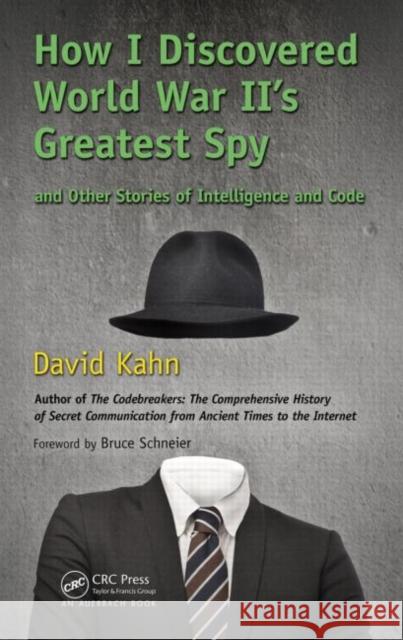How I Discovered World War II's Greatest Spy and Other Stories of Intelligence and Code » książka
How I Discovered World War II's Greatest Spy and Other Stories of Intelligence and Code
ISBN-13: 9781466561991 / Angielski / Twarda / 2014 / 489 str.
How I Discovered World War II's Greatest Spy and Other Stories of Intelligence and Code
ISBN-13: 9781466561991 / Angielski / Twarda / 2014 / 489 str.
(netto: 195,46 VAT: 5%)
Najniższa cena z 30 dni: 201,44
ok. 22 dni roboczych.
Darmowa dostawa!
Spies, secret messages, and military intelligence have fascinated readers for centuries but never more than today, when terrorists threaten America and society depends so heavily on communications. Much of what was known about communications intelligence came first from David Kahn's pathbreaking book, The Codebreakers. Kahn, considered the dean of intelligence historians, is also the author of Hitler s Spies: German Military Intelligence in World War II" "and Seizing the Enigma: The Race to Break the German U-Boat Codes, 1939-1943, " "among other books and articles.
Kahn s latest book, How I Discovered World War II's Greatest Spy and Other Stories of Intelligence and Code, provides insights into the dark realm of intelligence and code that will fascinate cryptologists, intelligence personnel, and the millions interested in military history, espionage, and global affairs. It opens with Kahn telling how he discovered the identity of the man who sold key information about Germany s Enigma machine during World War II that enabled Polish and then British codebreakers to read secret messages.
Next Kahn addresses the question often asked about Pearl Harbor: since we were breaking Japan s codes, did President Roosevelt know that Japan was going to attack and let it happen to bring a reluctant nation into the war? Kahn looks into why Nazi Germany s totalitarian intelligence was so poor, offers a theory of intelligence, explicates what Clausewitz said about intelligence, tells on the basis of an interview with a head of Soviet codebreaking something about Soviet Comint in the Cold War, and reveals how the Allies suppressed the second greatest secret of WWII.
Providing an inside look into the efforts to gather and exploit intelligence during the past century, this book presents powerful ideas that can help guide present and future intelligence efforts. Though stories of WWII spying and codebreaking may seem worlds apart from social media security, computer viruses, and Internet surveillance, this book offers timeless lessons that may help today s leaders avoid making the same mistakes that have helped bring at least one global power to its knees.The book includes a Foreword written by Bruce Schneier.
"











